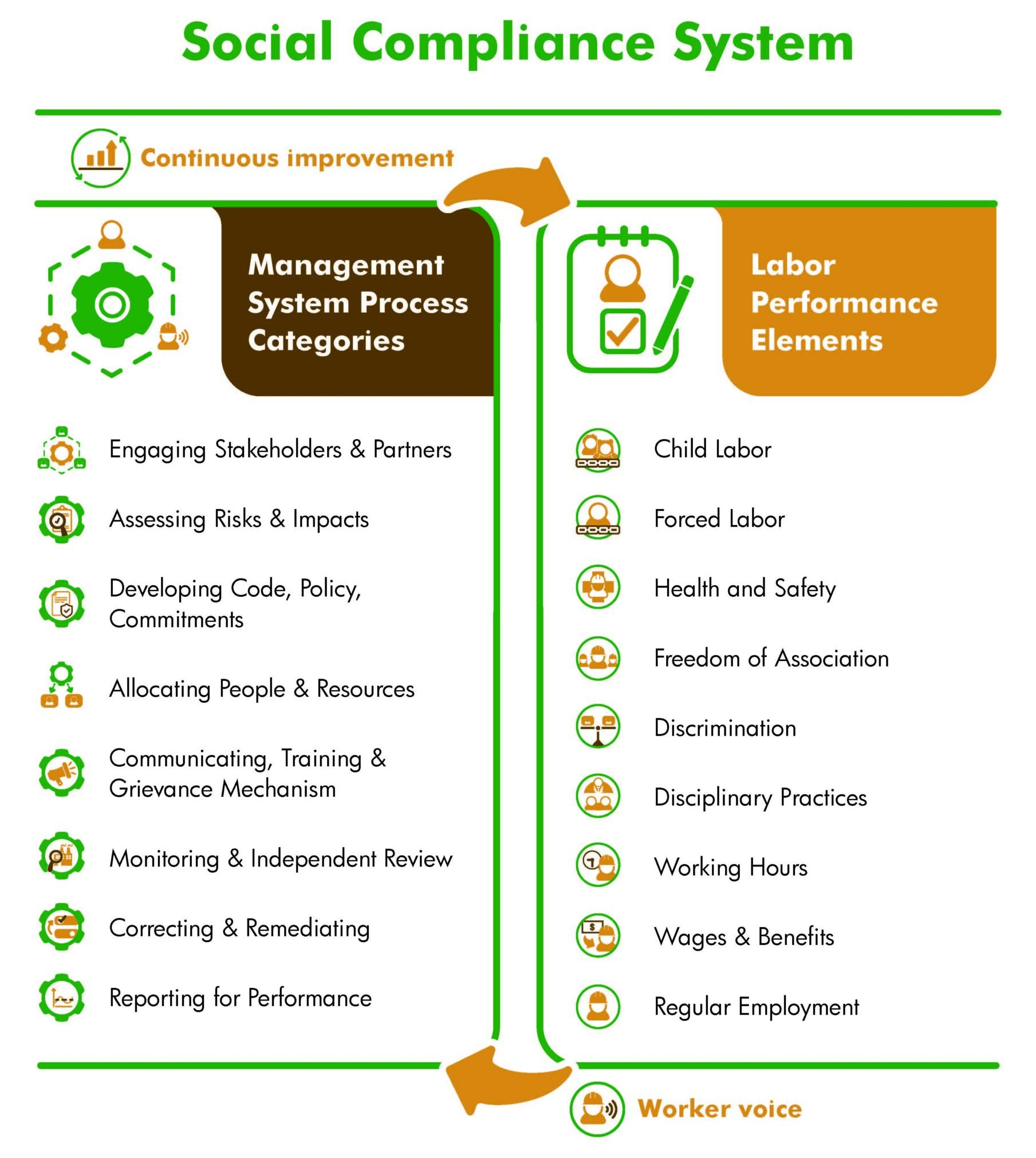What is a Social Compliance System?
The MY Voice Social Compliance System (SCS) is a framework for companies to achieve and maintain decent working conditions in their operations and supply chain. It emphasizes purposeful and systematic business practices and meaningful integration of workers’ voices. Put another way, an SCS is a management system approach for complying with labour performance expectations.
An effective SCS also strengthens business practices throughout the organisation and can help companies…
- Prevent and mitigate non-compliance with labour laws and standards;
- Meet requirements of the global market (e.g., buyer codes of conduct, human rights due diligence requirements, product certifications, etc.);
- Improve their reputation for reliability and responsibility in the international market;
- Improve employee engagement and loyalty; and
- Achieve better product quality and process productivity.
Components of the MY Voice SCS
The MY Voice SCS breaks the concept of management systems into eight crucial processes and identifies nine core labour risk areas, making it easy for companies to understand what they should have in place to effectively manage labour risks on an ongoing basis.

Management System Process Categories: The eight management system categories describe processes an organization should have in place to effectively manage their labour performance. In other words, these are the routine activities that allow an organisation to effectively comply with labour standards and laws on an ongoing basis.
Labour Performance Elements: The nine labour performance categories are based on the human rights of workers laid out in international and national laws, standards, and regulations. While some of the criteria may vary based on the specific standard being applied, they will all have the same principles. Making this SCS model a useful tool to help companies comply with a variety of regulatory and voluntary expectations and requirements, such as buyer codes of conduct, product certifications, trade regulations, and more.
Worker Engagement and Dialogue: A central focus of the MY Voice project is ensuring effective and inclusive integration of workers’ voices in all aspects of the employer’s SCS. Worker expertise and feedback are essential for effective risk identification, monitoring, action planning, policy review, and all other SCS management processes. MY Voice helps create neutral spaces and channels for management to engage with workers and helps facilitate integration of workers into SCS processes through tools like Social Performance Teams, worker voice technology, and grievance mechanisms.
While all SCSs share a core set of standard processes and address the same categories of labour risk, effective systems are tailored to the size, nature, and complexity of the company. They should also be customized to integrate with other management systems in place – such as those for quality control, health and safety, or environmental impact. MY Voice works with our private sector partners to customize the SCS model to fit the company’s particular size, context, and nature.
Related Resources
Palma Futuro Handbook for Social Compliance Implementation (SAI, 2024) – This handbook and accompanying toolkits provide comprehensive guidance for implementing each SCS element in the MY Voice SCS model. Although tailored to the palm oil industry in Latin America, it can be used by any employer to get a basic understanding of the concepts, and many of the tools are universal. Available in English and Spanish.
Get Started
If you represent an employer or buyer in the palm oil or garment industries in Malaysia, reach out to learn how MY Voice can help assess and improve your company’s SCS: contact@myvoiceproject.org.
The SCS model used by MY Voice is based on SAI’s Social Fingerprint and the U.S. Department of Labor’s Comply Chain. Social Fingerprint is an assessment and capacity-building framework to comprehensively identify and address strengths, weaknesses, and areas of improvement in labour performance elements and management system categories. Comply Chain is a series of documents intended to help companies build or improve a social compliance system to avoid violation of U.S. trade law prohibiting importation of goods made in whole or in part with forced labour.
